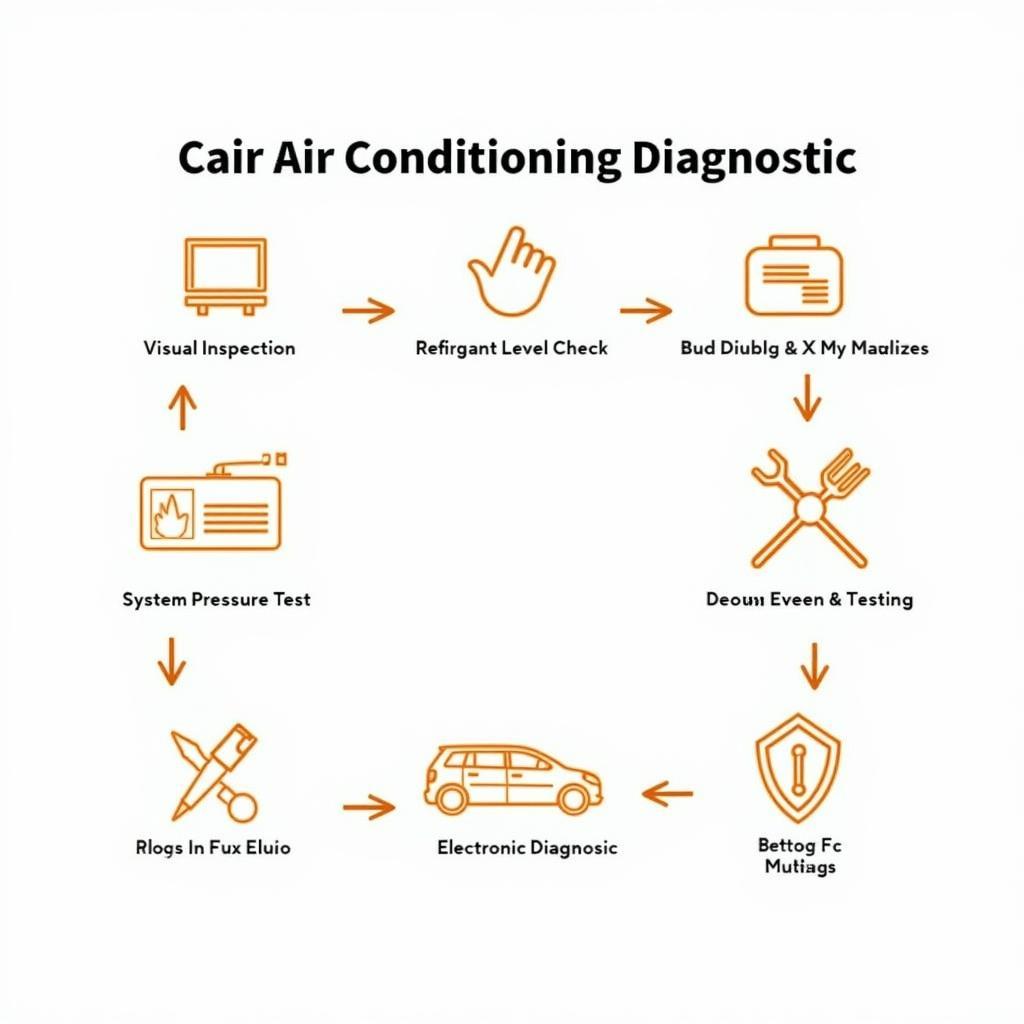Understanding the intricacies of your car’s air conditioning system can be a challenge, especially when it comes to diagnosing problems. A malfunctioning AC system can significantly impact your comfort, particularly during hot weather. This comprehensive guide delves into the essentials of car air conditioning diagnostics, empowering you with the knowledge to keep your cool.
Understanding Car Air Conditioning Systems
Before we dive into diagnostics, it’s crucial to grasp the basics of how your car’s AC system operates.
The system relies on a refrigerant, a specialized fluid that cycles through a closed loop. This refrigerant absorbs heat from the passenger cabin and releases it outside the vehicle. The process involves several key components:
- Compressor: This component pressurizes and circulates the refrigerant throughout the system.
- Condenser: Positioned at the front of your vehicle, the condenser functions similarly to a radiator, releasing heat absorbed by the refrigerant.
- Evaporator: Located inside the dashboard, the evaporator absorbs heat from the cabin air, cooling it down.
- Expansion Valve (or Orifice Tube): This component regulates refrigerant flow, ensuring optimal cooling.
Common Car Air Conditioning Problems
A range of issues can disrupt your car’s AC system, leading to discomfort and potentially costly repairs. Let’s explore some of the most frequent culprits:
- Refrigerant Leaks: Leaks in the system are a common cause of AC failure. Refrigerant can escape through worn-out hoses, seals, or components.
- Compressor Issues: The compressor is the heart of the system and can encounter problems like electrical faults or internal wear and tear.
- Electrical Problems: Malfunctions in wiring, sensors, or the AC control module can disrupt the system’s operation.
- Blower Motor Failure: If your AC blows weakly or not at all, the blower motor, responsible for pushing air, could be faulty.
The Importance of Professional Car Air Conditioning Diagnostics
Attempting to diagnose and repair your car’s AC system without the proper knowledge and tools can be risky and lead to further damage. Professional car air conditioning diagnostics offer several advantages:
- Accurate Diagnosis: Technicians utilize specialized equipment, such as leak detectors, pressure gauges, and electronic diagnostic tools, to pinpoint the root cause of the problem.
- Safe Handling of Refrigerant: Refrigerant requires careful handling, and improper procedures can be harmful to both humans and the environment. Certified technicians are equipped to manage refrigerant safely.
- Comprehensive Repairs: Once diagnosed, professionals can perform the necessary repairs, from recharging refrigerant to replacing faulty components, ensuring your AC system is restored to optimal working order.
What to Expect During a Car Air Conditioning Diagnostic
 Car Air Conditioning Diagnostic Process
Car Air Conditioning Diagnostic Process
During a car air conditioning diagnostic, a qualified technician will typically perform the following:
- Visual Inspection: They will examine the AC components for visible damage, leaks, or loose connections.
- Refrigerant Level Check: Using specialized gauges, the technician will determine if the refrigerant level is sufficient.
- System Pressure Test: This test helps identify blockages or leaks within the system by measuring pressure at various points.
- Component Testing: The technician will test individual components like the compressor, condenser, and blower motor for proper function.
- Electronic Diagnosis: If necessary, they will use a scan tool to read error codes stored in the vehicle’s computer, providing insights into electrical issues.
Tips for Maintaining Your Car’s Air Conditioning System
To prevent costly repairs and keep your car’s AC running smoothly, consider these maintenance tips:
- Regular AC Use: Run your AC system for at least 10 minutes every two weeks, even during colder months, to keep the refrigerant circulating and lubricate components.
- Visual Inspections: Periodically check for any signs of leaks, such as oily residue around AC components.
- Condenser Cleaning: Keep the condenser free from debris like leaves and dirt, which can obstruct airflow and reduce efficiency.
- Professional Inspections: Schedule an annual inspection by a qualified technician to ensure your AC system is in optimal condition.
Conclusion
A properly functioning car air conditioning system is essential for a comfortable driving experience. Understanding the basics of AC systems, recognizing common problems, and seeking professional diagnostics when needed will help you stay cool and avoid unexpected breakdowns.
Remember, timely maintenance and expert diagnostics are key to extending the life of your car’s AC system and ensuring a comfortable ride, no matter the temperature outside.
FAQs about Car Air Conditioning Diagnostics
1. How do I know if my car needs AC diagnostics?
If you notice any of the following, it’s time to get your car’s AC system checked: weak or no airflow, warm air blowing, unusual noises from the AC system, a foul odor when the AC is on, or frequent need for refrigerant recharges.
2. How often should I get my car’s AC system checked?
It’s generally recommended to have your car’s AC system inspected annually, preferably before the start of the summer season.
3. Can I add refrigerant to my car’s AC myself?
While DIY refrigerant recharge kits are available, it’s not recommended unless you have the proper knowledge and equipment. Improper handling of refrigerant can be dangerous and environmentally harmful.
4. How long does a car air conditioning diagnostic take?
A typical car air conditioning diagnostic can take anywhere from 30 minutes to an hour, depending on the complexity of the issue.
5. What is the average cost of car air conditioning repair?
The cost of car air conditioning repair can vary widely depending on the problem, make and model of your vehicle, and labor rates in your area. It’s always best to get a quote from a reputable mechanic before proceeding with any repairs.
6. Can a car air conditioning diagnostic detect electrical problems?
Yes, a comprehensive car air conditioning diagnostic will include electronic diagnosis using a scan tool to identify any electrical faults within the system.
7. What should I look for when choosing a mechanic for car air conditioning diagnostics and repair?
Look for a mechanic specializing in car AC systems, preferably with ASE (Automotive Service Excellence) certification. Check online reviews and ask for recommendations from friends and family.
Need help with your car’s air conditioning?
Contact us today via WhatsApp: +1(641)206-8880, or Email: [email protected]. Our 24/7 customer support team is ready to assist you. You can also find more information on our dedicated pages for car air conditioning diagnostics near me, car air conditioning diagnostic service, and car diagnostic air conditioning. For those located in Altrincham, our mobile car diagnostics altrincham service can be particularly convenient. If you’re looking for a comprehensive assessment in Birmingham, our full report car diagnostic bham service is an excellent option.

